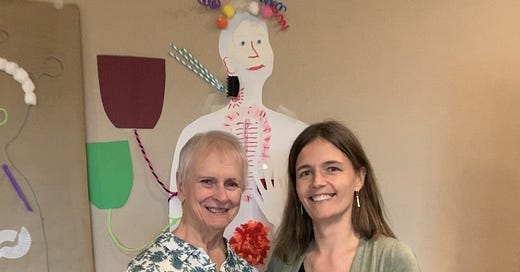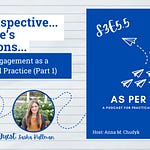Fun fact!
Although they have known each other for over two years, Kathy and Anna finally met each other in-person just before they shot this onePERspective. They took the above photo as proof! Kathy was in Winnipeg to help co-lead data collection for a study that they are both a part of. Exciting times!!!!
Meet our guest listener
Kathy Smith: Kathy Smith is a cancer survivor and a cancer care partner actively engaged as a co-author in many healthcare research projects - including Anna M. Chudyk’s work on better understanding patient partners’ perspectives on engagement and exploring future directions for Canadian patient-oriented research. She is a patient research/awards reviewer for many organizations including the Canadian Cancer Society.
Episode Transcript:
Anna:
Hi everyone! Welcome back to onePERspective. A tri-weekly segment in which patient partner Kathy Smith recaps the previous week’s episode of asPERusual – a podcast for practical patient engagement. Today’s episode of onePERspective is special for two reasons.
For starters it marks the first time that Kathy and I have actually seen each other in-person. Although we’ve worked together for over two years in varying capacities, we hadn’t met each other until a few days ago, when Kathy came into town to help co-lead data collection for a participatory design study we are both a part of. As we met I couldn’t help but think of what Alies, our previous episode’s guest had said when she appeared on Season 1 Episode 8 of asPERusual. That is, how funny it is to know someone for a long time as a floating head and then to finally meet them in person with a whole body attached. I’m so glad we finally got a chance to hang out in-person Kathy and I hope the opportunities to do so keep coming. And for anyone who is interested, check out our free newsletter or website (asperusual.substack.com) for a photo from our meeting.
Another reason this episode is special is that it focuses on a detour from our regular season 2 programming. That is, the episode focused on a patient-led report from our friends at the Patient Advisors Network, instead of a Strategy for Patient-Oriented Research funded entity. Although I do love patterns and neat boxes, I felt that this deviation was very important given the novelty and findings of this Reimagining the Research Landscape Report, highlights of which I’m sure Kathy will cover next.
Alright so before I turn it over to Kathy, there are some acronyms and contextual points I will quickly cover to ensure that all of our listeners out there are able to follow along:
The Canadian Institutes of Health Research (or CIHR for short) is Canada’s national funder of health research.
In approximately 2010, CIHR established the Strategy for Patient-Oriented Research (or SPOR for short) to champion and support research that focuses on patient-identified priorities and outcomes and involves meaningful and active collaborations between patients, care partners and researchers (the latter of which is referred to as patient engagement in research). SPOR is recently undergoing a revamping, which they have called the SPOR Refresh, which involves among other things, consultations with the patient-oriented research community.
The Patient Advisors Network (or PAN for short) is an independent, non-profit pan-Canadian organization comprised of patients and care partners that was asked by SPOR to carry out their own consultation activities to help inform the SPOR refresh.
Ok so I hope that was more helpful than confusing, and I do encourage everyone out there to listen to last week’s episode or check out our website (asperusual.substack.com) for today’s interactive transcript that will help make things even more clear. And with that, over to you Kathy for your onePERsective!
Kathy Smith:
Thanks, Anna. It was really a pleasure to finally meet you in person, and I'm looking forward to many more partnerships as we move forward!
This is a unique SPOR initiative that we're looking at today. The pan-Canadian Patient Advisors Network (PAN) was tasked to survey patients engaged in research experiences right across Canada. Alies Maybee and Donna Rubenstein, along with a patient steering committee, created and produced an innovative and precedent setting experience survey to inform decision makers of POR experiences. A whopping 262 patients engaged or wanting to become engaged in research responded.
What set this survey apart from the many existing surveys is that the questions were asked and supplied solely by patients for patients. As Donna explained, “the questions we asked were not the cookie cutter, usual survey questions. We asked questions harvested from the perspectives of what patients identified themselves as important to understand.” As a result, they captured new data, opening the door to better understanding the patient perspectives engaging as a partner in research.
Some examples of questions included:
When you contributed, did you feel your voice was heard?
Was your input valued and acted upon?
Did you feel comfortable asking questions?
Did you experience covert or unconscious bias for not being an academic?
Did you feel you were making an impact or made an impact?
Was your role integral, significant, or tokenistic?
The answers did not surprise me. Overwhelmingly, a huge number of the 262 respondents felt that they were discriminated and disrespected because they were not academics. They did not feel their voices were heard as equals. The traditional research landscape does not presently equally value the voices of all its contributors. But in my experience, I believe they are fully on board to transforming that ecosystem by learning from us. I commend Alice and Donna and their team for capturing data to help shift this paradigm.
Another strong survey finding that will come as no surprise, but is now supported with strong evidence, is that the research community is a closed shop that is not great at communicating with the public community. We need to change the research community's SOP, or standard operating policies and procedures, in order to change the research landscape.
I really like the way Alies organized the findings at three levels of research environment to consider for changing:
At the micro level, the research team most closely aligned with the patients engaged in research.
At the meso level, administrators at universities and other research institutes. They are removed from the action, but are tasked by the research funder to manage the research grants. This is a major stumbling block and a bottleneck for researchers who want to and do engage patients in research — the time consuming, complicated, creeping barrage of administrative bureaucracy.
At the macro level, the major research funders like the Canadian Institute for Health Research are next level removed from understanding and championing POR. Yet they are the ones who set out the research grant requirements, the timelines for deliverables, and the criteria for who should and who should not be funded.
There are many other interesting and innovative suggestions for this transformation in the research ecosystem that can be found in the Patient Advisor Networks’ pan-Canadian Patients Engaged in Research survey. If you'd like to check it out for yourself, the name of the report is Reimagining the Research Landscape.
Personally speaking:
The patience of time needed to build meaningful and respectful relationships is the cornerstone to successful patient engagement in research. Funders need to acknowledge its importance and to fund this fundamental first step.
We must flatten the power dynamics between the patients and researchers by meeting people where they are at. Bring your authentic whole self to the table. Listen attentively and be open minded. We are all more than just our health condition.
Nothing about me without me is the ticket for patients to rightfully participate in patient centered research.
Anna:
Thanks so much Kathy. One of the many things that I also enjoyed about Donna and Alies’ episode was what I affectionately term “bonus content.” These were additional insights into important topics that flowed out of our conversations, such as
expected and unexpected benefits of patient-led research;
tips for how to support patient partners in bringing diverse perspectives to engagement opportunities through the establishment of patient advisory councils comprised of large numbers of patient partners. This is an idea I’ve been looking to incorporate into my own research program and it was great to hear more about it in action.
Until next time, please be sure to check out our website (asperusual.substack.com) for resources from today's episode, and an interactive transcript from this and previous episodes. Please also remember to subscribe to this podcast through our website or wherever it is that you download your podcast episodes. While you’re there, if you take the time to leave us a positive review, it will help others find the podcast as well. Lastly, for those of you who'd like to contact me, please shoot me an email at anna.asperusual@gmail.com. Thanks so much for tuning in! Have a great couple of weeks! And until next time, let's keep working together to make patient engagement in research the standard or As PER Usual.














Share this post